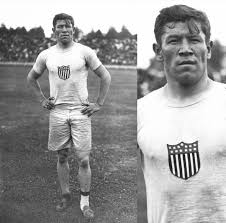The Legacy of Jim Thorpe: America’s Greatest Athlete

Introduction
Jim Thorpe, born in 1887, is widely regarded as one of the greatest athletes in American history. His remarkable talents spanned multiple sports including football, baseball, and the Olympic decathlon. The significance of Thorpe’s achievements goes beyond mere athletic prowess; he embodies resilience, diversity, and the struggle for recognition in a society that often overlooked Indigenous peoples. His story is not only one of personal triumph but also a reflection of the broader challenges faced by Native Americans in the early 20th century.
Career Highlights
Thorpe burst onto the national scene at the 1912 Stockholm Olympics, where he won gold medals in both the pentathlon and decathlon, only to have them stripped later due to amateurism violations. Despite this setback, he continued to excel in professional sports, notably joining the NFL as a player and later serving as its president. In addition to football, Thorpe played major league baseball, showcasing an incredible versatility that few athletes could match.
Recent Developments
In recent years, there has been a renewed interest in Jim Thorpe’s legacy, aiming to restore honor lost during his lifetime. In 2022, the International Olympic Committee made a historic decision to reinstate Thorpe as the rightful gold medalist by recognizing and giving back his medals. This reinstatement has invigorated discussions around athletic integrity and the importance of acknowledging the contributions of diverse athletes in history.
Ongoing Impact
Thorpe continues to inspire athletes and advocates for Indigenous rights around the world. Many organizations and movements focus on promoting sports among Native American youth, encouraging them to draw on Thorpe’s legacy as a source of pride and motivation. With annual awards and honors named after him, Jim Thorpe’s name symbolizes excellence and endurance.
Conclusion
Jim Thorpe remains an essential figure not only in the world of sports but also in the realm of cultural history. His life story, marked by unparalleled achievements and struggles against injustice, resonates with many today. As society strives for a more inclusive recognition of athletes from diverse backgrounds, Thorpe’s legacy serves as a cornerstone for discussions about race, identity, and sportsmanship. Moving forward, there is hope that Jim Thorpe’s remarkable story continues to inspire future generations, urging them to overcome barriers and strive for greatness.









